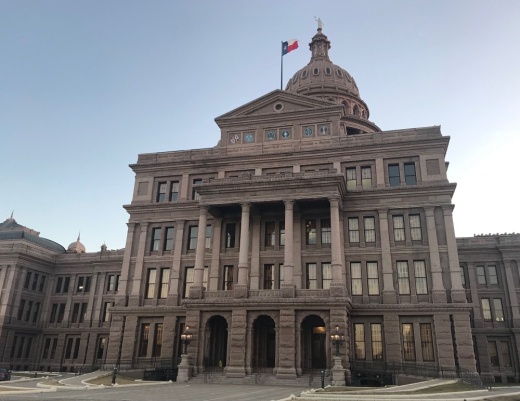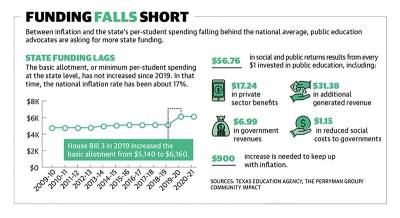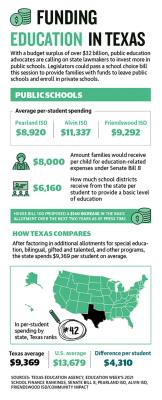Senate Bill 8, filed by Sen. Brandon Creighton, R-Conroe, would create an education savings account program, also known as private school vouchers. Parents who pull their children out of public schools could receive $8,000 per student for private school tuition and other education-related expenses.
SB 8 is one of Gov. Greg Abbott’s seven emergency priorities for the 88th legislative session.
“My job is to make sure we get across the finish line a piece of legislation that will return mom and dad to being in charge of their child’s education,” he said during a visit to Cypress Christian School on March 21.
State spending
The Legislative Budget Board reported the program would cost the state over $531 million through August 2025. While the program would not use funds allocated for public schools, opponents of the legislation have expressed concerns that more funding is needed in public schools, which could lose more money if their students leave to attend private schools.
The basic allotment—the amount school districts receive from the state per student to provide a basic level of education—has been set at $6,160 per student since 2019-20. Texas ranks No. 42 nationally in per-student spending, according to Education Week’s 2021 School Finance Rankings.
The Texas comptroller of public accounts reported a $900 increase would be needed just to keep up with inflation; however, based on the legislation moving through the Texas House as of press time, legislators were looking at a $140 increase. In 2019, House Bill 3 included a $1,020 increase in the basic allotment for an estimated $4.5 billion.
“We are begging for any morsel of additional funding for public schools, and where vouchers come in is they do the opposite,” said Laura Yeager, director of Just Fund It TX, a nonpartisan organization advocating for increased funding for public schools.
School districts across the state, including Pearland ISD, approved budget deficits in fiscal year 2022-23. Community Impact previously reported PISD is projecting $15 million, $17 million and $20 million budget deficits in the next three school years if state funding levels remain unchanged.
PISD Superintendent Larry Berger said he was not concerned about the prospect of any legislation increasing competition between public and private schools.
“If parents find our educational services lacking, we do not need to get upset because there are other options. We must understand why they feel this way, adjust and improve our services,” Berger said.
Berger said PISD’s main concern is the “unfair nature” of the funding attached to bills like SB 8, questioning why prospective private school vouchers would receive thousands more dollars than the current per-student allotment at public schools. He also indicated private schools receiving state funding would not have the same mandated services as public schools.
“Fund public schools with the same per-student funding formula to ensure equity of services,” Berger said.
Debating the bill
Statewide public education advocacy nonprofit Raise Your Hand Texas was founded 17 years ago primarily to push back against the voucher movement happening in the Texas Legislature at the time, Senior Director of Policy Bob Popinski said.
Popinski said the program would also negatively affect public schools financially, as the state funding they receive is based on students’ average daily attendance.
Michael Barba, K-12 education policy director at the Texas Public Policy Foundation, a conservative think tank based in Austin, argues that data from comparable programs across the country shows a minimal impact on public school attendance. He said similar programs nationally show less than 3% of eligible students use the program in the first five years after its inception, which would amount to about 60,000 students transferring in Texas.
Barba said he believes school choice programs can lead to improved public school systems, and families choosing alternative options acts as a signal to districts to design their programs to better suit families’ needs.
“When you give families choices, the school districts also improve, and that improves education for every child in the community,” he said.
As of press time, the bill was referred to the House, where it was expected to face heavy opposition. The same day SB 8 passed in the Senate, the House amended the state budget to prohibit the use of public funds for education savings accounts in an 86-52 vote. During previous legislative sessions, voucher programs have died in the House without a committee hearing.
Hannah Norton contributed to this article.








